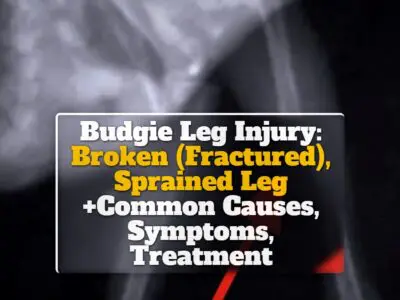What are worms? Worms are animals with a long and soft body that is flattened or round. There are almost 2,600 kinds of worms. They can be found in rainy forest areas and freshwater.
Worms need moist soil to survive. Some earthworms can live up to 8 years, but it is almost impossible to live that much for a worm because they are mostly killed or eaten by other species before they live for eight months.
Types of Worms that Affect Budgies
Two groups of internal parasitic worms that can cause trouble for budgies are roundworms and flatworms.
There are almost 23 different types of worms within that two groups. While some of them can be very common in budgies, the other ones appear rarely.
Roundworms
Roundworms can alter vary in shape and size. They might cause different symptoms based on where a warm chooses to live within the victim.
The thing that all kinds of roundworms use is the procedure of transmission.
An adult roundworm will leave eggs inside an infected bird. Infection allows an infected bird to scatter eggs for a long time, infecting others.
Hairworms
Hairworms, also known as Nematomorpha, is approximately 5 to 10 millimeters, white or cream-colored.
These worms, which look like small pieces of thread, last up to six weeks.
Their eggs are too small to be seen with the naked eye. Hairworm eggs can be found on dirty hands, surfaces, and objects.
Tapeworms
Tapeworms have many kinds that can infect birds.
Tapeworms, which settle in the intestines of birds and feed on the foods consumed by the birds to survive, can cause diarrhea as well as problems such as weakness and loss of appetite. If left untreated, it can cause the death of birds.
Do budgies get worms?
Budgies can become infected with worms if they contact birds, the environment, food, or water that is infected.
Budgies infected will spread worms during close approaches to the other birds. If infected insects are eaten by budgies, it will cause budgies to be infected rapidly; also, insects can spread worms in different ways, such as contaminating water or food.
How Do You Know If a Budgie Has Worms? The Symptoms
It is rare for a budgie to develop intestinal worms, but it does not mean it cannot cause any problem at all. There are numerous symptoms associated with parasites that you should be aware of as a bird keeper.
The easiest way to find out if your budgie is infected or not is to look out for worms in its poop. But there may be an understated sign, depending on the kind of worm.
The following are the examples of these:
| Worm types | Symptoms associated |
|---|---|
| Roundworms | Weakness, loss of energy, abnormal thinness, intestinal obstruction (in severe cases) |
| Hairworms | Loss of appetite, profuse weight loss, bloody diarrhea |
| Tapeworms | Diarrhea, inability to thrive |
How Do Budgies Get Worms?
Budgies can get worms in many ways. Such as the food budgie eats.
When the food is not stored well enough, this can create some warmth inside the food, and if you serve it to the budgie, it rapidly spreads to its body. Also, it causes other birds to be infected from the first budgie that is infected. The same thing happens with the other infected birds that your budgie contacts closely.
How Often Should We De-worm Budgies?
We should pay attention to when to worm budgie. If we don’t take care of the schedule of worming periods, it can also cause some problems for our budgies as well.
If your budgie is kept inside most of the time, you should be wormed every 3-6 months. Otherwise, you should worm your budgie 3-4 times a year.
Do I Really Need to Deworm My Bird?
In short, yes, you definitely need to deworm your bird/s to have healthy ones. Systematic worming is a must and should be controlled periodically.
Even one worm is enough to kill or harm your bird, so like many other species, birds can also interact with very bad stuff. Keep your birds healthy and parasite free by just checking worming regularly.
Do Birds Poop Worms?
In this respect, we are really lucky because if we analyze carefully the poop of our birds, we can find out whether the birds are infected or not. We should be checking the poops periodically to not miss any sign of worm.
Why Are There Worms in My Bird Cage?
One of the reasons for a worm to live in your bird’s cage is not having a clean area for your birds, also not having a proper environment for your cage can cause worms.
Cleanliness is very significant because if the place is dirty, you can’t see worm or any other dangerous species. The food you gave to your birds must be clean as well.
How Do You Get Rid of Worms in Bird Seed
When you encounter the problem of having worms in the birdseed, firstly, you should remove the all worms from the container and if you have a chance, store it in a different and new container. If you don’t have the chance, don’t forget to vacuum the container after cleaning every corner of it.
Why is My Budgie Scratching His Bottom?
Unfortunately, your budgie might be suffering from worms. Worms mostly cause the vent area to itch very badly.
Why are There Worms in My Bird’s Food?
If you store the birdseed inside the house, you might be in danger. Food must be stored in a cool and dry place outside of home to avoid worms as well as any other dangers. The storage must have rodent and insect-proof specialty.
Diagnosing Worms in Budgies
You can recognize if your budgie has worms. You just have to monitor your budgie. You should check its eating habits, poops and behavior. Most of the budgies that are infected show signs of weight loss, weakness, diarrhea. Also budgies might make more noise than normal.
Diagnosis of Roundworms in Birds
You can find out your budgie has roundworms or not by just checking out its droppings for parasitic eggs. If you are sure that your budgie has roundworms, don’t worry, it is very easy to kill worms, if you go to the vet early enough.
Budgie Worm Treatment & Recovery & Prevention
There are some tasks you have to do to save your budgie. Medications depend on the kind of worm the budgie has. Your vet prescribes a proper medicine for your bird and will check your bird the track the recovery after a period of time.
The tasks we mentioned above:
- Pay attention to deworming your budgie
- Don’t let your budgie contact with too many birds
- Don’t let your budgie eat off the ground
- Don’t forget to place food into proper feeders
- Clean the feeders and waterers frequently
Budgie Worm Prevention
To prevent worms from your budgie, you must worm it. If you keep your budgie inside, you should be wormed it 4-5 times a year. Budgies that live outdoor are at higher risk than inside budgies, so because of that, you should be worming your outdoor budgie every 3-6 months, also there are some other ways to prevent worms.
Avoid Other Water Sources
Nobody wants to risk his/her budgie for just changing water source. Use what you trust and tried.
Caution When Administering Medication
Be careful about mixing directions on the medications that are given by your vet. While giving wrong dose of medicine could damage your budgie, weak dose of medicine might not be enough to kill worms.
Don’t Accidentally Worm Hatchlings
Be sure to worm budgies before breeding season start. Worming budgies that have hatchlings are not recommended.
Don’t Use Expired Medicine
Checking expiry dates are fundamental for your budgies to survive. Don’t forget that worming is a long process and you need a medicine that lasts long time.
How to Give Deworming Medicine to Budgies
Water is your best friend when it comes to giving medicine to budgies. Blend 1 teaspoon full of deworming medication into 1 liter of fresh water. One dose is adequate for deworming budgies. To make budgies drink the medicine, at night, remove their water sources and in the morning, give them the medicine as a water. They will be thirsty and it won’t be problem. Do this 2-3 days more and after that, to remove all the mess, clean the cage to have a worm free environment.
Can birds pass worms to humans?
Yes, they can. Actually, one of the creatures that do this best is budgies. According to some sources, birds and their droppings can carry 60 diseases.
The worms that most affect the budgies are roundworms, tapeworms, and hairworms.
Numerous reasons can cause having a worm inside a budgie. One of them is the birds that your budgie contacts. If you observe strange behaviors, eating habits, or worms in droppings after the connection with another bird, the other could be the reason for worms in your budgie. In addition, food, water, and environmental factors have an important role in this matter.

![Budgie Zinc Poisoning [Symptoms, Causes, Treatment]](https://www.petiska.com/wp-content/uploads/2022/06/budgie-zinc-poisoning-symptoms-causes-treatment-1654089731-400x300.jpg)
